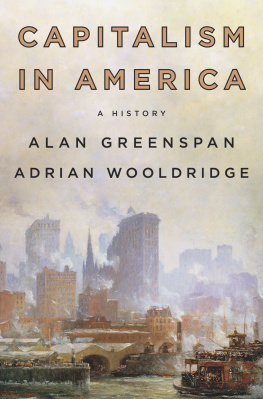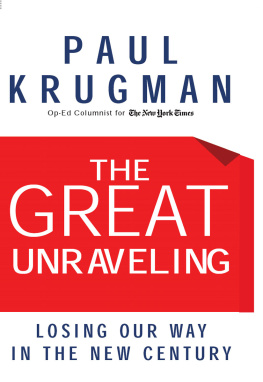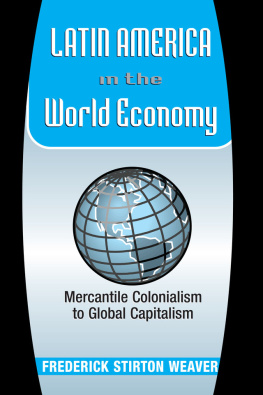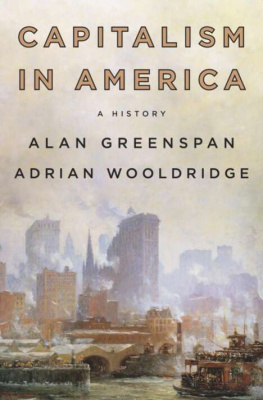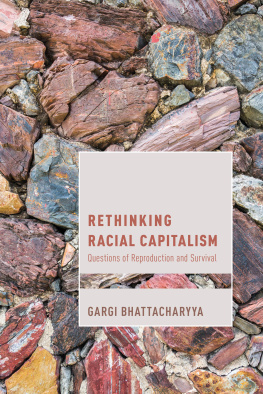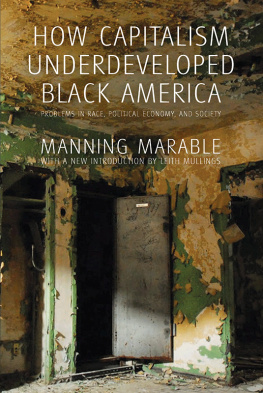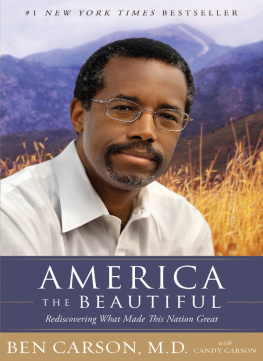ALSO BY ALAN GREENSPAN
The Map and the Territory
The Age of Turbulence
ALSO BY ADRIAN WOOLDRIDGE
The Great Disruption
Masters of Management
Measuring the Mind
( WITH JOHN MICKLETHWAIT )
The Fourth Revolution
God Is Back
The Right Nation
The Company
A Future Perfect
The Witch Doctors
PENGUIN PRESS
An imprint of Penguin Random House LLC
375 Hudson Street
New York, New York 10014
penguinrandomhouse.com
Copyright 2018 by Alan Greenspan
Penguin supports copyright. Copyright fuels creativity, encourages diverse voices, promotes free speech, and creates a vibrant culture. Thank you for buying an authorized edition of this book and for complying with copyright laws by not reproducing, scanning, or distributing any part of it in any form without permission. You are supporting writers and allowing Penguin to continue to publish books for every reader.
LIBRARY OF CONGRESS CATALOGING-IN-PUBL ICATION DATA
Names: Greenspan, Alan, 1926- author. | Wooldridge, Adrian, author.
Title: Capitalism in America : a history / Alan Greenspan, Adrian Wooldridge.
Description: New York City : Penguin Press, 2018.
Identifiers: LCCN 2018020397 (print) | LCCN 2018022007 (ebook) | ISBN 9780735222458 (ebook) | ISBN 9780735222441 (hardback)
Subjects: LCSH: CapitalismUnited StatesHistory. | United StatesEconomic conditions. | United StatesEconomic policy. | Economic history. | BISAC: BUSINESS & ECONOMICS / Economic History. | HISTORY / United States / General. | BUSINESS & ECONOMICS / Development / Economic Development.
Classification: LCC HB501 (ebook) | LCC HB501 .G6454 2018 (print) | DDC 330.973dc23
LC record available at https://lccn.loc.gov/2018020397
Version_1
Greenspan:
For my beloved Andrea
Wooldridge:
For my American-born daughters, Ella and Dora
INTRODUCTION
L ETS START THIS HISTORY with a flight of fancy. Imagine that a version of the World Economic Forum was held in Davos in 1620. The great and the good from across the world are assembled in the Alpine village: Chinese scholars in their silk robes, British adventurers in their doublets and jerkins, Turkish civil servants in their turbans and caftans... all edge along the icy paths, frequently tumbling over, or gather in the inns and restaurants, animated by alcohol.
The subject of the conference is an explosive one: who will dominate the world in the coming centuries? Everyone wants to make the case for their corner of the planet. You rush from panel discussion to panel discussion (and then stumble from after-party to after-party) to absorb the Davos wisdom.
The Chinese have a compelling argument. Peking has a population of more than a million at a time when the biggest European cities (London, Paris, Nice) have no more than three hundred thousand. The imperial civil service is selected from an immense country on the basis of the worlds most demanding examinations. Chinese scholars have compiled an eleven-thousand-volume encyclopedia. Chinese sailors have built the worlds biggest ships.
Others make a good case too. A Turk boasts that the Ottoman Empire, the most important of an arc of Islamic countries extending from Turkey and Arabia to sub-Saharan Africa and Asia, is expanding westward and will soon hold Europe under its sway. A Mughal says that his empire mixes people from every race and religion in a cocktail of creativity. A Spaniard boasts that Spain is sweeping all before itblessed by the one true Church, it is bringing the rest of Europe under its benign rule and extending its power even to Latin America (where a huge store of gold and silver is funding yet further expansion). A plucky Briton makes the most unlikely case of all. His tiny country has broken with a corrupt and ossified continent and is developing dynamic new institutions: a powerful Parliament, a mighty navy (backed up by a few pirates), and a new species of organization, the chartered corporation, which can trade all over the world.
In all of the arguing in Davos, one region goes unmentioned: North America. The region is nothing more than an empty space on the mapa vast wilderness sitting above Latin America, with its precious metals, and between the Atlantic and Pacific oceans, with their trading routes and treasure troves of fish. The wilderness is populated by aboriginal peoples who have had no contact with the Davos crowd. There are a few Europeans in New England and Virginiabut they report that the life is hard and civilization nonexistent. The entire North American continent produces less wealth than the smallest German principality.
Today the United States is the worlds biggest economy: a mere 5 percent of the worlds population, it produces a quarter of its GDP expressed in U.S. dollars. America has the worlds highest standard of living apart from a handful of much smaller countries such as Qatar and Norway. It also dominates the industries that are inventing the futureintelligent robots, driverless cars, and life-extending drugs. Americas share of the worlds patents has increased from 10 percent when Ronald Reagan was elected in 1980 to 20 percent today.
The American economy is as diverse as it is huge. The United States leads the world in a wide range of industriesnatural resources as well as information technology, paper, and pulp as well as biotechnology. Many leading economies are dangerously focused on one city: most obviously the United Kingdom but also South Korea and Sweden. The United States has numerous centers of excellence: New York for finance, San Francisco for technology, Houston for energy, and Los Angeles for films.
American capitalism is also the worlds most democratic. The United States was the birthplace of the engines of popular capitalism, from mass production to franchising to mutual funds. In many countries capitalism has always been associated with a plutocratic elite. In America, it has been associated with openness and opportunity: making it possible for people who were born in obscurity to rise to the top of society and for ordinary people to enjoy goods and services that were once confined to the elites. R. H. Macy, a former whaling skipper with a tattoo on one of his hands, sold goods suitable for the millionaire at prices in reach of the millions. Henry Ford, a farmers son, trumpeted the Model T as a car for the common man. Amadeo Giannini, an Italian immigrant, founded the Bank of America in order to bring banking to the little guy. Pierre Omidyar, another immigrant, created an electronic bazaar, eBay, for ordinary people to engage in free exchange.
Americas rise to greatness has been marred by numerous disgraces, prime among them the mistreatment of the aboriginal peoples and the enslavement of millions of African Americans. Yet judged against the broad sweep of history, it has been a huge positive. America has not only provided its own citizens with a prosperous life. It has exported prosperity in the form of innovations and ideas. Without Americas intervention in the Second World War, Adolf Hitler might well have subdued Europe. Without Americas unwavering commitment to the Cold War, Joseph Stalins progeny might still be in power in Eastern Europe and perhaps much of Asia. Uncle Sam provided the arsenal of democracy that saved the twentieth century from ruin.

